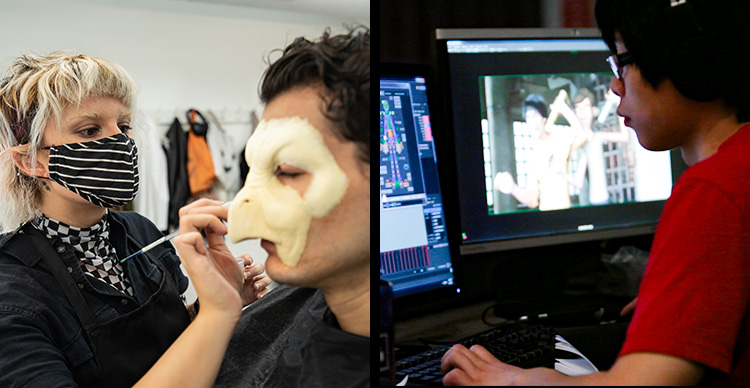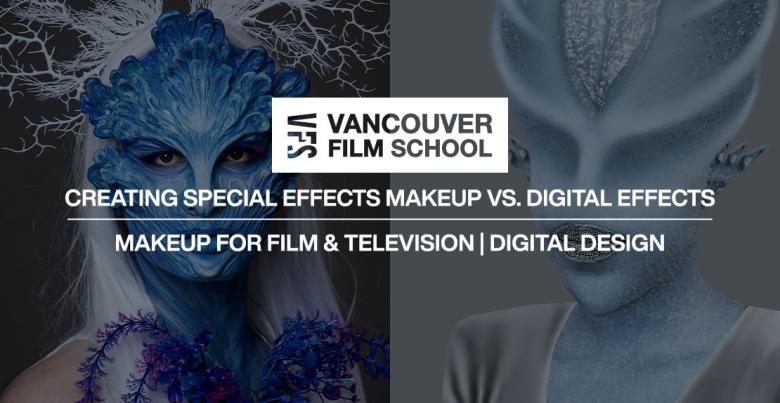Key Takeaways
- Artistic vision forms the foundation for both special effects makeup and digital effects careers, requiring strong creative visualization skills regardless of medium.
- Vancouver Film School offers comprehensive training in both digital design techniques for visual effects and traditional makeup application for practical effects.
- Most modern productions utilize both practical and digital effects in combination, creating opportunities for professionals who understand both film production techniques for special effects implementation .
The world of special effects makeup and digital effects present contrasting yet complementary career paths for creative professionals, with each discipline requiring unique skills and training approaches. Vancouver Film School offers specialized programs in both fields, providing students with hands-on practical training and industry connections essential for success. VFS's Makeup Design for Film & Television program trains students in the physical art of transformation, while our Digital Design program equips students with the technological skills needed for virtual effects creation. Students immerse themselves in real-world production environments, gaining invaluable experience that prepares them for seamless integration into the film, television, and gaming industries.
ARTISTIC VISION DRIVES INNOVATION IN BOTH PRACTICAL AND DIGITAL EFFECTS
Creativity serves as the cornerstone for both special effects makeup artists and digital effects specialists, with artistic vision guiding all technical decisions throughout the creative process. Special effects makeup artists rely heavily on traditional art foundations such as sculpture, painting, and colour theory to create believable transformations directly on actors. Digital artists similarly depend on artistic fundamentals but express their creativity through virtual environments, applying their visual storytelling techniques through software rather than physical materials. Both disciplines require professionals to develop substantial creative problem-solving skills, as artists frequently encounter unique challenges that demand innovative approaches regardless of whether they work with physical prosthetics or digital assets.
Concept Artists Transform Raw Ideas into Tangible Visual Plans
Modern concept artists utilize sophisticated digital sketching techniques to visualize characters and effects before any physical materials or 3D assets are created. Makeup departments translate these visual development plans into practical applications through careful analysis of the concept art's anatomical structure, texture details, and colour relationships. The collaborative process between concept artists and effects teams involves multiple feedback rounds, with ZBrush concept sculpting often serving as a bridge between traditional artists and the technical teams who will implement the final effects.
Essential Creative Skills for Special Effects Artists
- Strong drawing abilities to visualize ideas before implementation
- Color theory knowledge for realistic skin tones and textures
- Sculptural techniques for creating dimensional effects
- Understanding of light and shadow behavior across surfaces
- Anatomical knowledge for realistic creature and character design
- Visual storytelling capabilities that enhance narrative impact
- Creative problem-solving when technical challenges arise
TECHNICAL EXPERTISE REQUIREMENTS DIFFER BETWEEN SPECIAL EFFECTS FIELDS
The technical skills required for special effects makeup include prosthetic creation, mould making, and application techniques that require extensive hands-on practice to master fully. Digital effects professionals, in contrast, must develop proficiency in complex software packages such as Maya, Houdini, and Nuke, with each program requiring months or years to learn thoroughly. Certification programs exist for both fields, though digital effects typically have more formalized technical certification pathways through software companies like Autodesk, while makeup artistry often relies on professional makeup techniques demonstrated through portfolio work rather than specific credentials.
Vancouver Film School Teaches Cutting-Edge Technical Skills for Both Disciplines
Vancouver Film School provides students with access to professional-grade makeup lab resources, including specialized prosthetic workshops equipped with industry-standard materials and tools. VFS's digital programs feature high-performance digital effects workstations and rendering farm capabilities that mirror professional studio environments, allowing students to work with the same software they will encounter in their careers. We offer specialized courses in both disciplines but maintain separate, focused programs rather than combined curriculum approaches, ensuring students develop deep expertise in their chosen field without sacrificing depth for breadth.
 VFS students master their craft over 1 intensive, production-focused year at VFS.
VFS students master their craft over 1 intensive, production-focused year at VFS.EDUCATIONAL PATHWAYS SHAPE CAREER TRAJECTORIES IN EFFECTS INDUSTRIES
Formal education provides essential structured learning environments for special effects careers, offering access to equipment, mentorship, and foundational knowledge difficult to acquire independently. Digital effects proficiency typically requires two to four years of focused study and practice before artists reach professional-level competency, with software fundamentals taking months to learn and artistic application of those tools requiring substantially more time. For individuals interested in both makeup and digital effects, the most effective educational route involves choosing a primary specialty to study formally while developing complementary skills through supplementary workshops and certificate programs that build cross-disciplinary understanding.
Vancouver Film School Offers Comprehensive Programs in Both Effects Disciplines
VFS's Makeup Design program prepares students through intensive hands-on training with professional-grade materials and techniques, culminating in portfolio projects suitable for industry showcases. The 3D Animation & Visual Effects program provides comprehensive training across the digital production pipeline, with students gaining experience in modeling, texturing, animation, and compositing within a simulated studio environment. Students at Vancouver Film School focus on their primary program of study, but VFS offers opportunities for cross-disciplinary exposure through specialized workshops, guest lectures, and collaborative projects that connect students from different departments.
PRACTICAL SKILLS VERSUS DIGITAL TOOLS IN SPECIAL EFFECTS CREATION
Special effects makeup artists must master practical sculpting techniques and develop proficiency with specialized tools like airbrushes, spatulas, and detail brushes to create convincing transformations. Digital effects artists require deep software proficiency across multiple specialized applications, including 3D modeling tools, compositing software, and simulation programs that calculate realistic physics for elements like cloth, fluid, and destruction effects. Modern productions increasingly combine practical effects materials with digital effects pipelines, requiring technical directors who understand the advantages and limitations of both approaches and can determine the optimal techniques for specific creative challenges.
Mastering Materials Requires Different Approaches in Each Field
Contemporary special effects makeup relies heavily on silicone prosthetic techniques for realistic skin textures, while foam latex applications remain valuable for specific applications requiring flexibility and durability. Digital artists now employ sophisticated physically based rendering systems that simulate material properties through mathematical models, creating convincingly realistic surfaces by calculating how light interacts with various substances. Certain organic textures and subtle human expressions still present challenges for digital replication, which explains why many productions continue to use practical makeup effects for close-up character work while reserving digital effects for wider shots and impossible physical transformations.
PORTFOLIO DEVELOPMENT STRATEGIES VARY BETWEEN MAKEUP AND DIGITAL EFFECTS
Effective special effects makeup portfolios showcase before-and-after transformations, demonstrating technical precision through detailed photographs that highlight texturing, blending, and sculptural elements. Digital effects artists organize their demo reels to demonstrate technical proficiency through breakdowns that show progressive creation stages, from wireframes to finished composites with appropriate technical data. Industry professionals consistently emphasize process documentation in portfolios, seeking evidence of problem-solving capabilities and technical understanding rather than merely impressive final results, with employers particularly valuing candidates who include clear explanations of their creative decision-making throughout projects.
Industry Connections Enhance Career Opportunities for Effects Artists
Building strong industry connections proves essential for effects artists, as many positions are filled through personal recommendations rather than traditional job postings. Aspiring professionals can develop these essential career development relationships through educational programs, industry conferences, and professional association memberships that facilitate networking with established practitioners. Production environments frequently require makeup artists and digital effects specialists to collaborate closely, with each discipline informing the other's approach through regular communication about character designs, technical constraints, and narrative objectives set by producers and directors.
Vancouver Film School prepares students for successful careers in both special effects makeup and digital effects through industry-focused training that emphasizes real-world production experience. Our specialized programs provide students with the technical skills, artistic foundations, and professional connections necessary to thrive in these competitive creative fields. Students interested in exploring these career paths can learn more about film production training opportunities that incorporate both practical and digital effects techniques.
